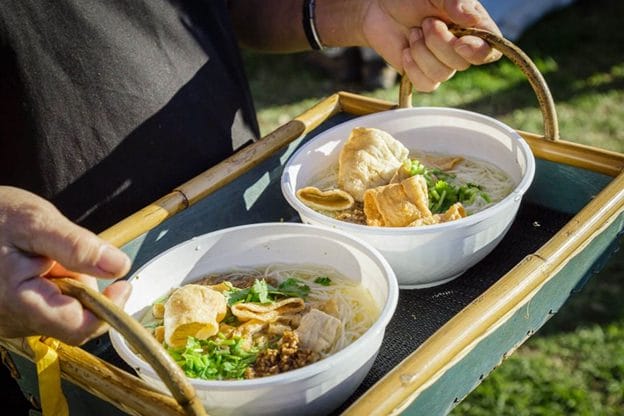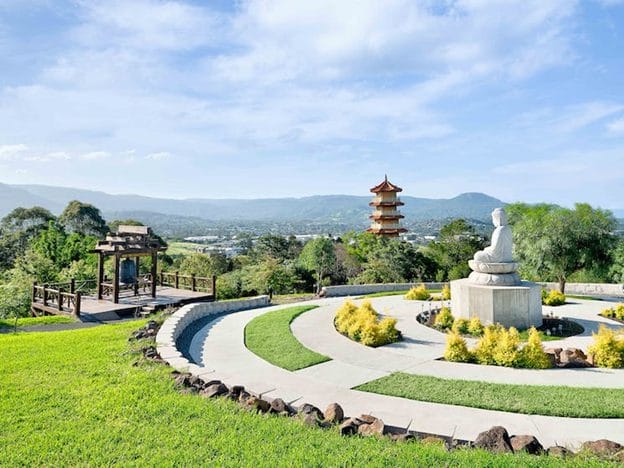Vesak Day in Australia | A Celebration of Enlightenment and Compassion
Vesak Day is a significant celebration that holds a special place in the hearts of Buddhists and those who appreciate its values around the world. In Australia, Vesak Day is observed by a small percentage of the overall population but with great affection, highlighting the country’s commitment to embracing and celebrating diversity.
In this comprehensive guide, we’ll explore the meaning and significance of Vesak Day, its origins, how it is practised in Buddhist countries , and the traditions associated with this day.

The Meaning of Vesak Day
Vesak Day, also known as Buddha Purnima or Buddha Jayanti, is one of the most important events in Buddhism. It commemorates the birth, enlightenment (Bodhi), and death (Nirvana) of Siddhartha Gautama, who later became known as Gautama Buddha. Vesak Day falls on the full moon day of the sixth month in the Buddhist lunar calendar, typically occurring in April or May. In 2024 it will be held on Thursday 23 May.
The day is observed to reflect on the life and teachings of the Buddha, with a focus on spiritual renewal, compassion, and enlightenment with the core message of Vesak Day to promote values such as non-violence, peace, compassion, and mindfulness. Buddhists and followers of other faiths use this occasion to reflect on their own spiritual journeys and strive to cultivate inner peace and understanding.
Origins and History
Vesak Day has its roots in ancient Buddhist traditions and is celebrated by Buddhists worldwide. Its origins can be traced back to the time of the Buddha himself, as the historical Buddha was born, attained enlightenment, and passed away on the same day, albeit in different years.
The celebration of Vesak Day in Australia is largely attributed to the presence of a diverse and growing Buddhist community in the country. This multicultural environment has allowed Vesak Day to become a widely recognised and celebrated occasion, reflecting Australia’s commitment to religious inclusion and cultural diversity.

Observance and Practices
Vesak Day is observed with a combination of religious and cultural practices. Buddhists and people from various cultural backgrounds come together to celebrate the occasion. Here are some common practices associated with Vesak Day:
Temple Visits: Buddhists visit temples and monasteries to make offerings, meditate, and engage in prayers and rituals. Many temples hold special ceremonies and processions on Vesak Day.
Offerings: Devotees make offerings of flowers, candles, incense, and food to Buddhist images and statues. These offerings symbolise reverence and respect for the Buddha’s teachings.
Acts of Kindness: Vesak Day encourages acts of compassion and generosity. Many Buddhists use this day to perform charitable deeds, such as giving to the needy or volunteering at community organisations.
Meditation and Reflection: Vesak Day is a time for introspection and meditation. Buddhists reflect on the Four Noble Truths, the Eightfold Path, and other key teachings of Buddhism to deepen their understanding.
Lantern Processions: In some regions, colourful lantern processions take place in the evening, symbolising the illumination of wisdom and enlightenment.
Traditions in Australia
In Australia, Vesak Day is celebrated by the Buddhist community and is often embraced by individuals from diverse backgrounds who are interested in Buddhism and its teachings. Some common traditions and practices associated with Vesak Day in Australia include:
Multicultural Celebrations: Vesak Day in Australia often reflects the country’s multicultural society. Cultural festivals and events take place, like the one held in Darling Harbour in 2023 showcasing the diverse Buddhist traditions and practices of different communities, where visitors can immerse in cultural festivities, enjoy vegan food and learn about sustainable practices.

Public Talks and Workshops: Buddhist organisations and temples host public talks, workshops, and seminars about Buddhism, its history, and its relevance in modern life. These events provide an opportunity for people to learn and engage with Buddhist teachings.
Food and Cultural Exhibitions: Vesak Day celebrations in Australia may feature cultural exhibitions, showcasing Buddhist art, artefacts, and traditional foods. This allows attendees to experience the rich cultural diversity within Buddhism.

Greeting Someone on Vesak Day
If you wish to greet someone on Vesak Day, it’s important to convey your respect for the occasion and your appreciation for their faith and culture.
There are a number of phrases you can use like:
“Wishing you a peaceful and blessed Vesak Day. May the teachings of the Buddha continue to illuminate your path.”
“On this sacred Vesak Day, may your heart be filled with compassion, and may your journey towards enlightenment be fruitful.”
“Happy Vesak Day! May the virtues of loving-kindness, compassion, and mindfulness guide your life.”
Or simply, “Happy Vesak Day!”
We spoke to a Venerable Jue Fang from Nan Tien Temple in Berkeley NSW, who celebrates Vesak Day and asked them to provide some insight into this significant Buddhist holiday which is widely celebrated throughout the world.

Your name and country of origin are:
Venerable Jue Fang, I am from Singapore.
Can you provide a brief overview of Vesak Day – its meaning, what it observes and how it is practised in your country of origin?
Vesak Day is celebrated throughout the world for Buddhists. It celebrates three things: The birth of Buddha, Buddha attaining enlightenment and Buddha entering nirvana. These three elements have been put together. Vesak Day is a public holiday and has been set by the United Nations.
What does Vesak Day mean for you personally?
This is a day of remembrance for me and a special day.
Most temples will have Buddha sitting or standing and all the statutes will also have a baby Buddha, to signify when he was born and able to walk, and importantly he proclaimed, ‘I am the truly honoured one.’
You will see the baby Buddha pointing to the earth and the sun. This is to signify that The Buddha is not the only person to be celebrated but everyone. This is for the dignity of everyone.
All of us are significant. The Buddha’s very nature is so that every living being possesses equality out of this Buddha nature. The baby Buddha’s message is as ‘honour as you and as honoured as me – we are all equal.’
I believe in inclusion and equality. This is the basis and the core value.
We have 10 temples all over Australia and New Zealand, and since 1992, we have celebrated Vesak Day with the public.
In NSW, we celebrate in Darling Harbour withmany multicultural performances, children’s blessings, alongside a blessing for mothers as it coincides with Mother’s Day. In Brisbane we celebrate in Southbank, in Perth at Elizabeth Quay, and at Federation Square in Melbourne -where we also had fireworks this year. Everyone and anyone can share the joy of the festival.
What traditions do you observe/practice?
At Nan Tien Temple (the largest Buddhist Temple in the Southern Hemisphere) located in Berkeley NSW, we practise humanistic principles – our traditions are Mahayana principles meaning I will do good deeds with a good body, with my mouth I speak good words, with my mind I think good thoughts.
The physical traditions we observe are such that chanting will take place. Founder, Ven Master Hsing Yun promotes humanistic Buddhism. All temples chant ‘I believe’, and we bring these celebrations to the public in the forms of parades, performances, exhibitions. We offer vegetarian food stalls, walkathons, and this brings like minded people together for the benefit of nature’s many forms. The overarching theme is to do good deeds – one of The Three Acts of Goodness.

How will you and your family members be recognising Vesak Day in the coming year?
We will have multi-cultural events again with an element of environmental protection.
If someone wants to wish you well during this time, how should they phrase the greeting?
“Happy Buddhist Birthday”, “Happy Vesak Day” or “Auspicious Greetings”.

